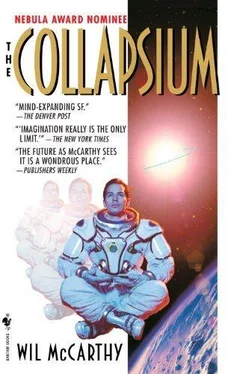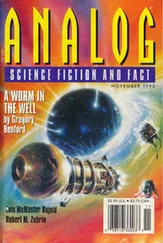Muddy managed—with visible strain—to scrape out a chuckle. “Ah, a touch of bitterness, of condescension. Go with it, Bruno; be human. Your respect is forced; honor me instead with your heartfelt disgust. There’s a good lad.”
Bruno sighed again. “Can I offer you a drug?”
“A drug! How novel. Indeed, yes, I’d be powerless to refuse some of Enzo’s Christmas brandy. Reduce this pain in me, sir. Your inertially corrupt’s-s-spacetime disagrees with me!”
“Brandy is not a painkiller.”
“Ah, but it is, Declarancy. It is.”
“Not the proper sort, and you know it. I’ll get you something… strong.”
Bruno glanced up, half expecting to see the stars themselves moving outside the wellstone “window” of the bow. But the star field was inert, unimpressed with their meddlings. The turning of his head left him dizzy; he nearly fell again, but caught himself with a hand on each of the two couches. Moving carefully and with many pauses, he extricated himself from between the couches, turned toward the fax, and pulled up a hypercomputer interface beside it so he could search the onboard libraries for a suitable painkiller. There were, it turned out, many thousands to choose from.
“We’re… really… moving along, aren’t we?” Muddy mused.
Turning slowly, Bruno looked up, and followed Muddy’s gaze to the instruments. Specifically, to the “Distance to Target” gauge, an old-style digital readout made from rows of illuminable red bars. It read in tenths of a meter, and at present its lower five digits were all flickery eights, changing too rapidly to register on the eye. The higher seven digits counted down smoothly, their speed increasing even as he watched.
“Indeed,” Bruno agreed. “We’ll reach the halfway mark in a couple of hours.”
This was no small feat; though the runaway grapple station had passed just over eight light-minutes of Bruno’s little planet—greater than the distance between the Earth and Sun—at its closest approach, it had since hurtled another fifty light-minutes toward infinity. Poor Deliah had probably traveled farther than any human being before her.
The fax made a little coughing sound and spat a pill into Bruno’s hand. He extended the other hand and extracted a glass of water, whose contents sloshed from side to side with even the slightest jostling as he rose to approach Muddy.
“Chair upright,” Muddy said, then screamed as the chair complied.
When all was ready, Bruno handed his counterpart the pill and the glass, watched him carefully ingest the one and sip from the other, then wince as if the act of swallowing caused some new pain of its own. He drank from the glass several times more, grimacing each time, and also complaining that it was “merely water.” Then finally the chair was reclined again, and the glass was carefully returned to the fax, and Bruno climbed awkwardly back into his own couch, managing to step on Hugo’s head twice during the process. Hugo mewled at this, but otherwise didn’t seem to mind.
“Sorry, old thing. I’d break the floor if it weren’t impervium.”
“Will this take effect quickly?” Muddy asked.
“It should, yes.” Bruno carefully strapped himself back in and cinched the straps tight. “Ah. Ah, yes. It’s much better to lie still.”
Muddy snorted beside him. “She is a fine ship, isn’t she?”
“For a cobbled-together prototype on her first shakedown cruise, I’d say she’s a bloody miracle.”
“Shall we name her?”
Bruno grunted; he hadn’t thought about that. Anthropomorphic instincts aside, he wasn’t much for naming inanimate things, or even semianimate ones like houses and small planets. But a ship was a different matter—it was animate, by definition. And it would need a name for legal registration if for no other reason. There was some optimistic thinking.
“All right, yes.” He ran through a few possibilities in his mind: the Redshift II , the Tamra Lutui, The Grappleship Old Girona . Then, belatedly catching a hint in Muddy’s tone, he asked, “You, ah, have something in mind?”
“I do. I thought perhaps the Sabadell-Andorra .”
That gave Bruno pause. Absurd on the face of it: by nature, spaceships were gracile and swift, where tectonic plates were among the slowest and heaviest objects ever manipulated by humans. And anyway, did anyone outside Catalonia even remember the pocket catastrophe of that earthquake? Then again, in component form this little spaceship massed considerably more than all the fallen hillsides of Girona, possibly as much as the Iberian plate itself, and the technology certainly was—well, earthshaking in its implications.
“All right,” he said finally, nodding, “ Sabadell-Andorra it is. And we’ll know what it means, at least.”
“I feel the medication working.”
Bruno turned to look at his… brother—his battered, mistreated counterpart. “Good. Excellent. Is it helping?”
“It is, yes. Ah. To be without pain, for even a moment…”
Muddy’s eyelids began to droop. Through thousands of years of civilization, mankind had yet to invent a reliable pain-suppression chemical that didn’t also proportionally suppress consciousness. Pain was simply too fundamental, too necessary , to be banished so easily; it bound itself up in every system of the body. There were various “nondrowsy formulas” Bruno might have tried, milder analgesics tempered with stimulants and euphoriants, but the ship’s library gave these much lower effectiveness ratings. Of course there was always the brute-force approach: simply deadening the spinal nerves. Muddy didn’t need to move for a while anyway, right? But sleep seemed a much kinder side effect than total paralysis.
“Thanks,” Muddy said blurrily; Then his eyes closed, his breathing slowed, and he just sort of faded away. It was a peaceful thing to watch, a hundred little tensions sliding out of that tortured body to leave it—finally!—at peace. Bruno almost feared he’d died until his chest rose and fell again slowly—and again, and again—his breathing shallow but steady. Muddy would awaken in four or five hours, just in time for the rendezvous with Deliah’s grapple station.
Bruno, seeing these hours stretching dully before him, wished he had some means to slip away so easily. All the hard hours in the study had taken their toll; he didn’t relish any further isolation. He spent fully twenty-eight seconds considering this before he, too, fell asleep.
He awoke to gravity fluctuations—a sense of rotation and weightlessness—followed by the slamming jerk of acceleration again. The first sound he heard was Muddy’s weeping—not a shriek or howl or moan this time but a quiet, private, sniffly sort of weeping that engendered immediate sympathy. He opened his eyes, saw Muddy lying there on the acceleration couch, his skin and tufted hair pale against the black leather.
His shirt had loosened in the night; the word “savage” was clearly visible on his shoulder in fluorescent green.
“Are you all right?” Bruno asked him gently.
Muddy jumped a little, startled. “What? Ah, Bruno. I was savoring a dream.”
Above, the bow afforded a view of Sol, at this range barely distinguishable from the stars around it.
“Mmm. A sad dream?”
“A dream about His Declarancy. Not sad, no; I dreamed he held a whip in his hand.”
“How terrifying!”
Muddy snorted. “Not at all. No, the whip is a personal, almost intimate expression between two people. It means he wants to talk, to exchange. But in my dream, he was whipping the sun, and flares were spinning out of it with every stroke, and he was saying your name over and over again, and when I asked him what he was doing, he turned to look at me. His face was blank, like a robot’s. I woke up.”
Читать дальше












